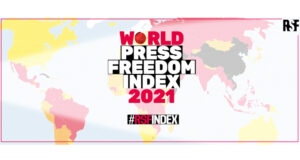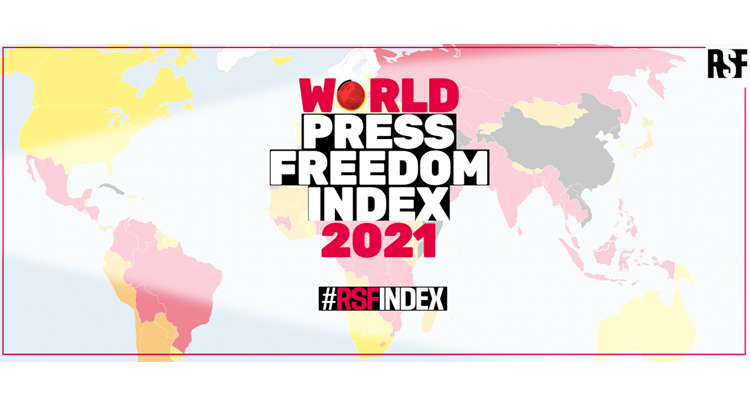 Ashis Sinha I New Delhi: India is rated as “unsuitable” for journalism and is one of the most dangerous countries for journalists attempting to do their work properly.
Ashis Sinha I New Delhi: India is rated as “unsuitable” for journalism and is one of the most dangerous countries for journalists attempting to do their work properly.
According to the World Press Freedom Index-2021 released on Tuesday (20 April) by “Reporters Without Borders” (RSF) India ranked 142nd position among 180 countries; this is the second constitutive year when India is ranked as a country that is “bad” for journalism.
This year’s Index, which evaluates the press freedom situation in 180 countries and territories annually, shows that journalism, journalism, which is arguably the best vaccine against the virus of disinformation, is totally blocked or seriously impeded in 73 countries and constrained in 59 others, which together represent 73 per cent of the countries evaluated.
These countries are classified as having “very bad,” “bad” or “problematic” environments for press freedom, and are identified accordingly in black, red or orange on the World Press Freedom map.
The index classified India as “one of the world’s most dangerous countries for journalists trying to do their job properly” with Brazil, Maxico and Russia. It cited police violence against journalists, “ambushes” by political activists, and “reprisals instigated by criminal groups or corrupt officers”, reported Newslaundary.
It said that Prime Minister Narendra Modi “tightens his grip on media”. With “four journalists killed in connection with their work in 2020, India is one of the world’s most dangerous countries for journalists trying to do their job properly”.
“Pressure has been increased on the media to toe the Hindu nationalist government’s line,” the report said.
“Indians who espouse Hindutva, the ideology that gave rise to radical right-wing Hindu nationalism, are trying to purge all manifestations of ‘anti-national’ thought from the public debate. The coordinated hate campaigns waged on social networks against journalists who dare to speak or write about subjects that annoy Hindutva followers are terrifying and include calls for the journalists concerned to be murdered,” the report said.
“In 2020, the government took advantage of the coronavirus crisis to step up its control of news coverage by prosecuting journalists providing information at variance with the official position,” it reported.
It also mentioned that “criminal prosecutions” are used to “gag” journalists critical of authorities, including charges of sedition. In Kashmir, it said, journalists still cope with “utterly Orwellian content regulations” and where media outlets are liable to be closed, as was the case with the valley’s leading daily, the Kashmir Times.
“While the pro-government media pump out a form of propaganda, journalists who dare to criticise the government are branded as “anti-state,” “anti-national” or even “pro-terrorist” by supporters of the ruling Bharatiya Janata Party (BJP),” report revealed.
Report stated, “Journalism is the best vaccine against disinformation,” RSF secretary-general Christophe Deloire said. “Unfortunately, its production and distribution are too often blocked by political, economic, technological and, sometimes, even cultural factors. In response to the virality of disinformation across borders, on digital platforms and via social media, journalism provides the most effective means of ensuring that public debate is based on a diverse range of established facts.”
Norway is ranked number 1 in the index, followed by Finland, Sweden, Denmark and Costa Rica. India’s neighbour Pakistan ranks at 145, Brazil shares the “bad” classification with India (142nd), Mexico (143rd) and Russia (down 1 at 150th). At the bottom of the index is Eritrea, with North Korea, Turkmenistan and China preceding it.
China (177th), which continues to take Internet censorship, surveillance and propaganda to unprecedented levels, is still firmly anchored among the Index’s worst countries, which are indicated in black on the World Press Freedom map.
Right below China is the same trio of totalitarian countries that have historically occupied the bottom three places.
Two are Asian: Turkmenistan (up 1 at 178th) and North Korea (up 1 at 179th). The third is African: Eritrea (down 2 at 180th). Regardless of their continent, these countries maintain absolute control over all news and information, enabling the first two to claim they had no Covid-19 cases and the third to maintain complete silence about the fate of 11 journalists who were arrested 20 years ago, some of whom has allegedly been held in metal containers in the middle of a desert.
The country that fell the furthest in 2021 was Malaysia (down 18 at 119th), where the problems include a recent “anti-fake news” decree allowing the government to impose its own version of the truth. Big descents were also registered by Comoros (down 9 at 84th) and El Salvador (down 8 at 82nd), where journalists have struggled to obtain state-held information about the government’s handling of the pandemic.
Most of the 2021 Index’s biggest gains are in Africa. Burundi (up 13 at 147th), Sierra Leone (up 10 at 75th) and Mali (up 9 at 99th) have all seen significant improvements, including the release of four journalists with the independent Burundian media Iwacu, the repeal of a law criminalising press offences in Sierra Leone and a fall in the number of abuses in Mali, it stated.




